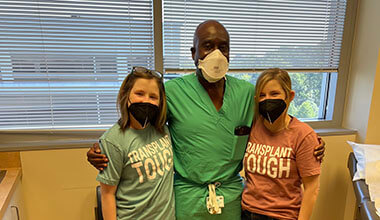Kidney and Kidney-Pancreas Transplant
Atrium Health Carolinas Medical Center has been a leading center for kidney transplantation since 1970, when the first kidney transplant was performed. Our kidney transplant program has continued to grow steadily, performing more than 5,000 pediatric and adult kidney transplants to date.
The kidney-pancreas transplant program is made up of:
- Surgeons
- Nephrologists
- Transplant coordinators (Nurses)
- Social workers
- Dietitians
- Pharmacists
- Financial counselors
Kidney Transplantation at Atrium Health: Why Choose Us?
At our center you will benefit from:
- Extensive Experience: Our multi-disciplinary team has been performing kidney transplants for more than 50 years with consistently excellent outcomes.
- Dedicated Transplant Coordinators: We have an experienced team of specially trained transplant coordinators that will support you through each phase of your transplant journey.
- Multi-Organ Transplants: We have a team of high-qualified experts able to transplant a donor kidney along with other organs such as pancreas, heart, or liver.
- Multiple Listings to Reduce Waiting Time: Whether we are your transplant “home,” or you are seeking multi-listing at our center, we work with other centers to share information to streamline your evaluation and help you increase your chances of transplantation.
- Personal Attention: We pride ourselves on the deep relationships we build with you and your support team. We take time to evaluate your physical health as well as to understand your goals for treatment, and design our care to fit your specific needs.
Extended Kidney Transplant Options Our Program Provides
Our goal is to get you a kidney quickly. To expedite this process, we offer:
- Living kidney donation program (including kidney paired donation)
- Blood type incompatible transplants
- Hepatitis C and Hepatitis B transplants
- Pediatric kidney transplants
Kidney transplant recipients experience many benefits by receiving a kidney from a living donor. Living donors could be a relative, friend, or even a stranger that may volunteer to donate a kidney to you through our living kidney donor program.
We leverage the clinical expertise of our immunology lab partners to identify patients appropriate for transplant from a donor with a different blood type.
With your consent, we can transplant a kidney from a donor that is positive for hepatitis. Our team of experts walks through the risks and benefits of this transplant option and offers post-transplant treatment and support to in many cases rid your body of the virus.
If your child needs a kidney transplant, you probably have many questions. Our dedicated pediatric kidney transplant team is here for you. We provide excellent care for your child, and we are available to address any concerns or questions you have. When your child is ready, we help with the transition into our adult transplant program. Learn more about our pediatric kidney transplant program here.
Kidney Transplant Services
We are committed to providing you and your family with the support you need throughout the transplant process. We offer a range of services to ensure you are successful:
- Dedicated transplant coordinators to coach you through the transplant process
- Dedicated team of experts and clinicians to assist with services such as billing, accommodations, mental health counseling and nutrition counseling
- In-person and virtual education classes, so you and your loved ones know what to expect before, during and after transplant
- Dedicated transplant care units staffed by nurses who have advanced training in kidney disease and transplants
- Collaboration with a variety of medical disciplines to address comorbidities and help you manage complex disease processes
- An engaged palliative care team is available to support you through chronic disease management as well as providing emotional support and counseling from a holistic perspective
- Dedicated post-transplant multidisciplinary care team to guide you through recovery and long-term success post-transplant
Atrium Health Transplant Center, a facility of Carolinas Medical Center
1025 Morehead Medical Drive, Suite 600
Charlotte, NC 28204
Phone: 704-355-6649
Our Providers
Meet our providers and find the one for you. Use the filters to narrow your search.
Location
Atrium Health Transplant Center, a facility of Carolinas Medical Center
1025 Morehead Medical Drive, Suite 600
Charlotte, NC 28204
Phone: 704-355-6649


